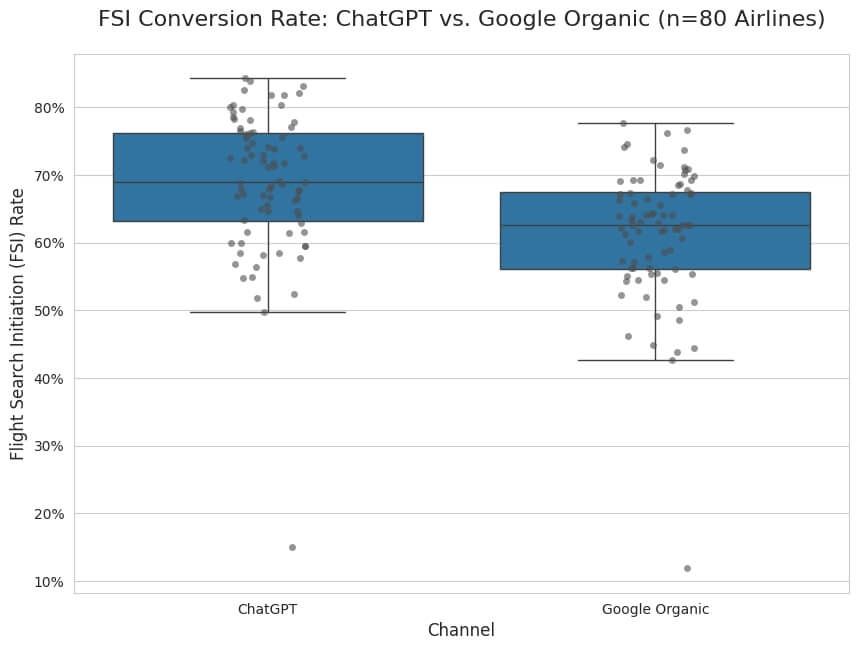Our statistical analysis spanning over 80 airlines demonstrates that traffic originating from ChatGPT has significantly higher booking intent than traffic from Google Organic search.
We compared the Flight Search Initiation (FSI) rate from both channels and found that ChatGPT users are, on average, more likely to proceed to the booking engine. This finding identifies ChatGPT as a powerful new source of high-intent, qualified traffic.
However, this opportunity is paired with a significant risk. As separate research has shown, while ChatGPT traffic is growing, airlines are frequently mentioned in answers but fail to win the citation link, which is instead funneled to OTAs and aggregators.
First, let’s explore the core finding.
TL;DR:
The FSI rate for ChatGPT referrals is +7.48 percentage points higher than Google’s, but airlines are at risk of losing this valuable traffic to OTAs.
What is FSI, and Why Does It Matter?
Flight Search Initiation (FSI) is a “click-to-search” metric that measures the number of times a user clicks from an airline’s airTRFX flight page directly to their Internet Booking Engine (IBE). It is a crucial signal of a user’s intent to search for or book a flight.
Crucially, FSI has been statistically validated as a reliable proxy for flight purchases. A recent study analyzing 27 carriers found a strong, positive correlation (0.77) between FSI events and completed purchases. That research also showed that, on average, a 10% increase in FSI leads to a 7.3% increase in bookings.
Therefore, a channel’s FSI rate is not just a click metric; it’s a strong indicator of its ability to drive revenue.
The Core Finding: ChatGPT vs. Google Organic FSI
The core finding is that ChatGPT traffic has a statistically significantly higher intent to book a flight than that from Google search.
Using Google Analytics 4 (GA4) data from the last 90 days, we measured FSI conversions from ChatGPT versus Google Organic, using a paired sample of 80 airlines that met specific data quality thresholds.

The results were clear and statistically significant.
- Mean ChatGPT FSI Rate: 68.87%
- Mean Google Organic FSI Rate: 61.38%
- Mean Difference: +7.48 percentage points (in favor of ChatGPT)
- Median Difference: +6.42 percentage points (in favor of ChatGPT)
The analysis confirmed this difference is not a random fluke. A Wilcoxon signed-rank test yielded a p-value of < 0.001, making the finding highly statistically significant. The analysis confirmed this is a substantial and practically meaningful effect.
High Intent vs. High Leakage
This finding demonstrates that ChatGPT is a valuable and fast-growing channel that airlines must take seriously. However, we have also found that this high-intent traffic is systematically leaking to competitors.
For example, airlines suffer from a 74.6% Unlinked Rate in ChatGPT. This means that in nearly three out of every four sentences where an airline is mentioned, ChatGPT links to a different website, usually OTAs and aggregators.
In most cases, airlines lose these clicks because their pages are often “data-poor”. They lack the citable fares, detailed flight information, and booking insights that AI models need to formulate an answer.
To stop leaking valuable ChatGPT traffic, airlines must focus on an AI search strategy:
- If a Route Exists, The Page Must Exist: Use scalable solutions like airTRFX to programmatically create a unique, indexable landing page for every route you operate.
- Make Every Fare Findable: Enrich pages to display a comprehensive range of fares, including one-way, round-trip, direct, connecting, and by cabin class.
- Provide Citable Flight Details: Add rich, easily-parsable flight information, such as flight time, route distance, scheduling frequency, and layover details.
- Offer Actionable Booking Insights: Convert internal booking data into a public asset by displaying the “cheapest month to fly” or “best day to book.”
- Be Technically Accessible: Ensure all critical content is server-rendered (not client-side JavaScript) and, most importantly, do not block OpenAI’s crawlers (ChatGPT-User or OAI-SearchBot).
Takeaway: High-Intent Traffic Demands a Citation Strategy
The data shows that ChatGPT is a maturing channel that delivers demonstrably more qualified, high-intent traffic than even Google Organic.
However, airlines are winning the “mention” battle but losing the “citation” war, as ChatGPT diverts clicks to OTAs and aggregators. Airlines must close the mention-to-link mismatch to stop the leakage and capitalize on this valuable ChatGPT traffic stream.
This requires an AI search strategy that enriches airline flight pages with comprehensive, structured, and citable data and fares that both AI models and human users need to make informed booking decisions.
Frequently Asked Questions
Flight Search Initiation (FSI) measures the number of times a user goes from an airline’s airTRFX page directly to their Internet Booking Engine (IBE). It’s a key indicator that a user is moving from the research phase to the booking phase. FSI has been statistically validated as a reliable proxy for flight purchases.
On average, ChatGPT’s FSI rate was +7.48 percentage points higher than Google’s (68.87% vs. 61.38%). The difference is highly significant, both statistically and practically.
Our FSI study proves that when an airline successfully captures a click from ChatGPT, that user is highly qualified and has high booking intent. However, separate research shows that airlines are failing to get that click nearly 75% of the time, even when their brand is mentioned. The high-intent click is “leaked” to OTAs and aggregators, who are being cited by ChatGPT instead.
The main takeaway is to treat this high-intent traffic as a valuable, must-win channel. The most important action is to make your airline’s flight pages “citable” for AI. This means ensuring you have a unique, indexable page for every route, displaying a full range of fares (not just one price), and providing rich flight details (like schedules, duration, and layover info) that ChatGPT can use as a source.

